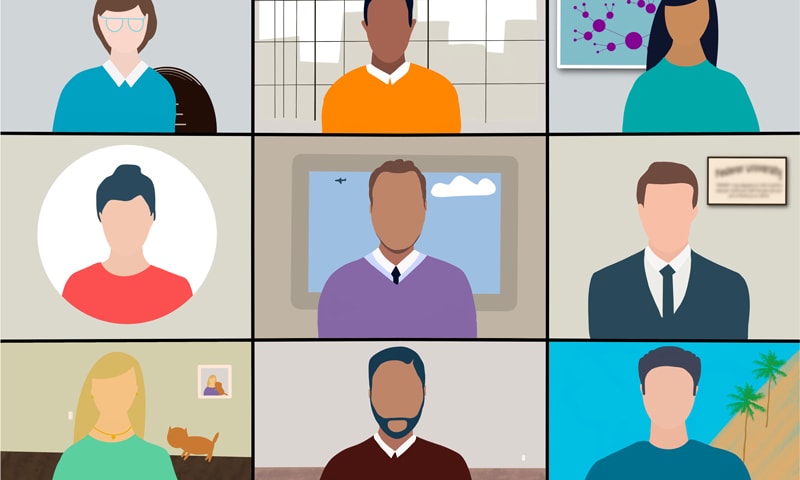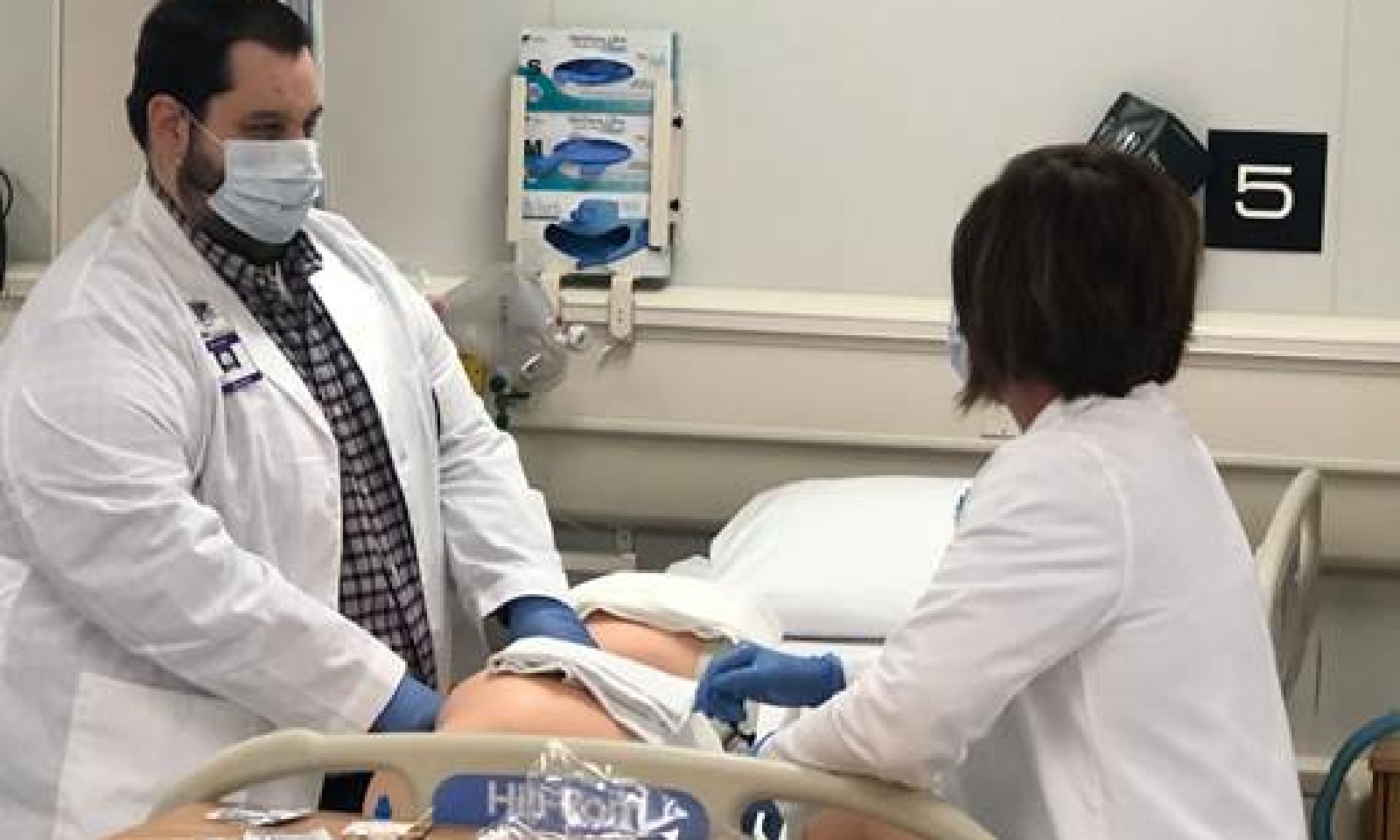Increased workloads. Time constraints. The physical and emotional demands of patient care. All of these make nursing school and a nursing career stressful.
For students and faculty at the LSU Health New Orleans School of Nursing, novel listening circles are helping to bring relief through self-care and resiliency training.
Panacea for Pandemic Stress
The impetus for launching the listening circles happened during the pandemic. When the first wave of COVID-19 hit Louisiana, students and faculty at the LSU Health New Orleans School of Nursing began dealing with mounting stressors. They had to quickly transition to remote learning and teaching. Faculty had to rethink ways to prepare nursing students for practice as hospitals dealt with an unfamiliar and highly contagious infectious disease. Students already dealing with the natural stresses of pursuing a nursing degree faced amplified levels of anxiety as they dealt with new challenges at school, at home and from the overall uncertainty accompanying a global pandemic.
“Being able to incorporate self-care strategies through education, social support and meaningful recognition is important when creating a healthy work environment. Nurses cannot survive the current health care environment without these tools for resiliency.”
Benita Chatmon, PhD, MSN, RN, CNE
“There was a lot of obvious anxiety among pre-licensure students as well as faculty,” says Jennifer Manning, DNS, ACNS-BC, CNE, Associate Dean for the Undergraduate Nursing Program, Program Director of the Baccalaureate Articulation Program, and Associate Professor of Clinical Nursing. “Students were asking questions like: ‘Will I graduate?’ ‘Do I even want to be a nurse anymore?’ So, we put our heads together as faculty, in collaboration with the LSUHSC Campus Assistance Program (CAP), to come up with ways to help.”
Most nurses pursue the profession with a “huge sense of empathy and an instinct for caregiving, so it’s easy to almost ignore your own needs and go on autopilot to care for others,” says Matthew Reese, RN, BS, Instructor of Clinical Nursing and a psychiatric-mental health nurse. “A lot of health care workers have been functioning like this throughout COVID, and then Hurricane Ida threw us off too.”
The leadership team had many discussions about how to promote self-care and build resiliency during the pandemic. The listening circle forum was one solution designed as a way for students and faculty to express their feelings, fears and concerns while getting support from others experiencing similar issues. Behavioral health staff from CAP and the School of Nursing leadership team take turns hosting these listening circles once a month for faculty and students.
“Opportunities for health care providers and nurse educators to decompress and utilize self-reflection and self-care techniques, including discussions about work/life balance and boundaries, are vital to promoting resiliency and improving mental health,” says Abby McNeil, DNP, FNP-BC, FPMHNP-BC, Program Coordinator for the BSN to DNP Psychiatric Mental Health Nurse Practitioner Program and Assistant Professor of Clinical Nursing.
Circles of Support
Each listening circle, held over Zoom, begins with ground rules, emphasizing that the circle is a safe space where people can share and others will listen without judgment and that nothing discussed in the circle will be shared outside the circle.

What follows is a centering activity, like a breathing exercise or progressive muscle relaxation, and then circle leaders ask participating faculty or students what they would like to discuss.
Circle leaders share self-care strategies like making meaningful connections, taking care of one’s physical health, giving oneself grace, and taking a break from social media, says Benita Chatmon, PhD, MSN, RN, CNE, Assistant Dean for Clinical Nursing Education and Assistant Professor of Clinical Nursing, whose background and research are in mental health nursing.
“Mental health has a tremendous effect on someone’s ability to think critically, reason and show empathy. That is why it’s so important for health professionals to start talking about their own mental health and well-being,” Dr. Chatmon says. “Being able to incorporate self-care strategies through education, social support and meaningful recognition is important when creating a healthy work environment. Nurses cannot survive the current health care environment without these tools for resiliency.”
Students and faculty involved report that they have really felt and appreciate the support, Dr. McNeil says. She says part of the circles involves developing a self-care plan that includes the ABCs – awareness, balance, and connections – and leaders encourage participants to check in with and care for their own mental health every day.
When it comes to self-care, suggestions may be as simple as “taking a walk, enjoying a piece of chocolate or taking a break from work to have some fun,” says Linda Ledet, DNS, APRN, PMHCNS-BC, Assistant Professor of Clinical Nursing and a board-certified adult psychiatric and mental health nurse. “And the purpose of the circles, overall, is to gain a shared sense of understanding of what everyone’s going through and become more emotionally connected.”
Dr. Ledet says she is hopeful these circles will continue even post-pandemic, because they are important opportunities for faculty and students to feel understood, navigate stressors and better relate to one another.
A Place for Sharing and Solutions
Listening circles provide a nonthreatening, welcoming, voluntary environment where participants can share and process their stressors, Reese says. It’s also an opportunity for leaders to highlight the mental health services available to students and faculty through CAP, should they need a little extra support.
“Mostly, it’s a healing space that also helps everyone develop a greater sense of empathy,” he says.
Dr. Manning says it gives both the leaders and the participants perspectives on each other’s experiences, allowing them to appreciate people’s realities, differences and intentions without just making assumptions.
“One thing we did learn, which I can share, is that while we assumed everyone could Zoom from their home when we transitioned to remote education, that was not a supportive learning environment for everyone,” Dr. Manning says. “Sometimes interruptions from young children or roommates made this very difficult; others were in environments where they were not being supported to attend nursing school at all. These insights allowed us to make some real changes – offering conference rooms some students could Zoom from to support their learning journeys.”
If participants seem to be significantly struggling, the circles also allow leaders to share all of the mental health resources available through CAP, like a crisis hotline, short-term counseling and referrals to other mental health services.
Helping Nurses Build Balance
“Our nurses have demonstrated resiliency time and time again; however, COVID has been challenging for many reasons. Nurses are the front line of most, if not all, patient interactions and being self-aware of their current mental health and their own needs is of the utmost importance,” says Scott Embley, LCSW, CEAP, Director of the LSUHSC CAP. “Self-care strategies can assist nurses in maintaining appropriate stress levels by making them more aware of how patient outcomes are affecting their overall mental health. Talking about stressors like unfavorable patient outcomes with colleagues can make nurses more aware of their feelings and personal triggers.”
Other self-care strategies may include getting enough sleep, exercising, eating regular and well-balanced meals, being self-aware of vulnerabilities, using support systems like family and friends and counseling when needed, he adds.
CAP launched a campuswide wellness committee that promotes self-care and the resources on campus and within the community. The program has also been designated as a Louisiana WellSpot through an initiative started by the Louisiana Department of Health aimed at improving the health and wellness of Louisiana residents.
“Nurses are caregivers and will give their heart and soul to others, but these strengths can also be a weakness,” Embley says. “Educating nurses on the importance of self-care and how practicing even a little bit of it can improve mood, decrease stress and prevent isolation can ultimately assist nurses with day-to-day interactions with patients and colleagues.”







